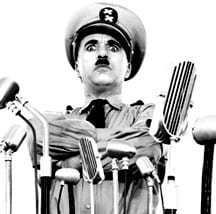Nearly 65 years after it began production, shock remains a primary reaction to the discovery of writer, director and star Charles Chaplin's 1940 film, The Great Dictator. Beginning principal photography before World War II broke out, The Great Dictator is Chaplin's spoken word debut, it's a divisive political statement from a man who strived most for universality, and it's a defining moment of his artistic life. In it, he plays up the resemblance between the Little Tramp and German dictator Adolf Hitler, brutally and comically skewering the rise of fascism. For contrast, Chaplin also plays a Jewish barber persecuted by German storm troopers any resemblance between the barber and dictator, the film points out, is coincidental. Historically, it's almost impossible to fully grasp how shocking and revelatory this comic satire was in its time. Chaplin himself had no idea how far Hitler would go after all, the film was completed and released more than two years before the United States would enter the war and said in retrospect, had he known the extremities of the Holocaust, he never would have made the film. That would have been a terrible shame, for Chaplin's was one of the first great voices of dissent, both in defence of Jews and against Hitler's regime. In order to retain full control of the vision of the project, Chaplin financed the entire production himself, and filmed (for more than 500 days) in a shroud of secrecy. The final product is a masterpiece, both mercilessly mocking and humanising Hitler, while bringing to light the persecution of Jews that Chaplin thought he was exaggerating but that tragically he would underestimate. To begin a list of comics and filmmakers influenced by Chaplin is an exercise in futility, but for a generation raised on Saturday morning cartoons, one particular influence is notable: Looney Tunes. Whether it's the barber sequences featured here or the slapstick of The Gold Rush or the over-the-top machinery sets of Modern Times, Looney Tunes consistently took Chaplin's work and exaggerated it with the colour and sound effects that Chaplin would never have access to. All the films in the Chaplin Collection are worthy historical documents, but The Great Dictator in particular feels like a legacy that should be passed on to another generation: to remember the power of satire, to see the courage of a man who used the power and influence granted him for a worthy cause, against the advice of his peers. And to marvel at his consummate skill. This immaculately produced DVD, which features extensive newly rediscovered colour film shot on set by Chaplin's brother Sydney, as well as an excellent documentary called "The Tramp and the Dictator," is a history lesson of epic magnitude. Extras: "The Tramp and the Dictator" documentary; on-set colour footage; "Charlie the Barber" 1919 short; more. (MK2/Warner)
The Chaplin Collection: The Great Dictator
Charles Chaplin

BY James KeastPublished Jan 1, 2006